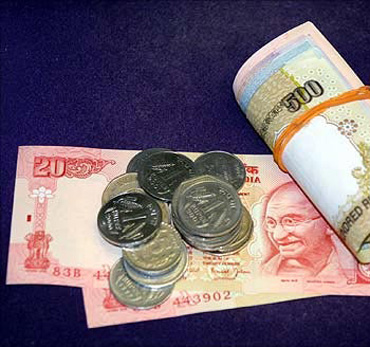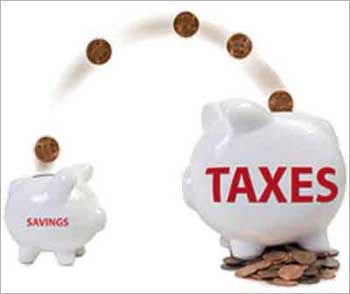 | « Back to article | Print this article |
Shocker! Pay tax on perks, now
Employees will now have to pay taxes on perquisites given to them by their employers as the Central Board of Direct Taxes has notified the much-awaited rules for valuation of the benefits.
With these rules, the fringe benefit tax (FBT) being paid by employers for giving non-cash benefits, including cars and employee stock options (ESOPs), to employees will be abolished and replaced with a regime that will tax the perquisites in the hands of the employees. It could mean less take-home pay for employees.
The rules are largely the same as what were prevalent before the introduction of FBT by finance minister P Chidambaram in 2005, though there are changes in the valuation of cars.
Employees provided with cars will now have to pay tax on a monthly valuation of Rs 1,800 for the vehicle and Rs 500 for chauffeur if the car capacity is less than 1.6 litre. For cars above that category, valuation will be Rs 2,400 for car and Rs 900 for chauffeur. The valuation prior to introduction of FBT was Rs 1,200 a month.
The government was earning Rs 6,000 crore (Rs 60 billion)annually from FBT. While welcoming the switchover to the new rules, experts say the replacement of FBT with taxation of perquisites collected as tax deducted at source (TDS) from employees will lead to a marginal fall in its revenue. "It is unlikely to be revenue neutral because FBT was being charged on notional value but now it is specific," said Rajesh Srinivasan, senior director, Deloitte.
Click NEXT to read on further. . .
Shocker! Pay tax on perks, now!
Srinivasan said FBT was causing complications for companies, though certain issues were still not clarified.
"Overall it is a good move. Primarily, the difference is that taxes were earlier being picked by employers and now employees are picking up the tab," he added. For those in the higher income bracket, it might not lead to higher taxes since the government abolished the income tax surcharge of 10 per cent last July. But for those in the middle and lower income group, it might lead to a higher tax outgo.
Among the grey areas, he said that since the budget came in July, companies had already paid the first instalment of advance FBT in June. The government would need to clarify whether this FBT would be treated as TDS of employees.
| WALLET WATCH | |
| PERK | TAX PRINCIPLE |
| Employer-owned accommodation | Depending on city, 7.5-15% of basic salary added to income |
| Leased/rent paid by employer | Actual rent, or 15% of salary, whichever is lower added to income and taxed |
| Company-owned car for personal use | Actual expenses, driver's salary added to income and taxed* |
| ESOPs | Difference of mkt value & grant price added to income & taxed |
| Interest-free/concessional loan (except medical reasons) | Interest component to be added to income |
| Salary to sweeper, gardener, PA | Added to income |
| Gas, electricity, water expenses | Added to income |
| Free/concessional education | Added to income |
| Company sponsored vacation | Added to income |
| Gift/vouchers of over Rs 5,000 | Added to income |
| Club membership/annual fees on credit card (other than official) | Added to income |
| *For part-official, part-personal use depending on engine capacity, up to Rs 3,300/month added to income | |
Shocker! Pay tax on perks, now!
Another area which requires clarity is the calculation for international workers. In the case of FBT, the government had issued FAQs (frequently asked questions), which were issued for apportionment. "Now, we need to know whether the same FAQs are applicable or a fresh notification will be issued," said Srinivasan.
With respect to taxing of other benefits like accommodation and employees stock options, the rules remain the same as earlier. The valuation on ESOPs is based on the distinction between shares of listed and unlisted companies. In the case of FBT, employers were paying the tax to the government for giving ESOPs and were recovering it from employees. Now, the employees will directly pay the tax.
While government employees will be taxed after the deduction of licence fee from the valuation arrived according to the city of accommodation, in the case of government employees on deputation to public sector companies and private sector employees, the tax will be on entire valuation.
Shocker! Pay tax on perks, now!
Double whammy for tax payers!
Your tax burden has just gone up, with the government issuing the new guidelines for taxation of perquisites.
In fact, it could be a double whammy, as you have to pay the additional tax liability for the whole of this financial year over the next three months.
Employees who were not paying tax on a host of perks such as company-provided cars, employee stock options, interest-free loans and salaries of gardeners and watchmen for the past five years now face an additional liability.
For instance, for an employee provided with a chauffeur-driven Honda Accord for official as well as personal use, the additional taxable income would be Rs 3,300 a month. So, the tax liability may be just about Rs 990 a month.
But, if the car is only for personal use, then the tax liability would go up. Assuming Rs 7,000 a month is spent on fuel and maintenance and another Rs 5,000 is paid to the driver, the entire Rs 12,000 would be added to the employee's income and taxed at the applicable rate.
So, for employees in the top tax bracket of 30 per cent, the liability could be around Rs 44,000 annually or a little above Rs 3,600 a month.
Shocker! Pay tax on perks, now!
"This (differentiation) is primarily because it is difficult to ascertain whether the vehicle is being used for official purpose or for personal purpose," said Deloitte tax partner, Homi Mistry.
With the Fringe Benefit Tax regime, introduced by P Chidambaram during the UPA government's last term, coming to an end in March 2009, employees getting stock options could be in for some higher burden. During the days of FBT, the burden had been transferred to employers. But now, the liability is once again on the employees.
According to the guidelines issued by the revenue department today, the difference between the fair market value on the date of exercising the option and the grant price would be added to income. So, if the grant price is Rs 100 and the fair market value on the date of exercise price is Rs 500, Rs 400 would be added to the employee's income.
In the case of food vouchers, despite the rise in prices, the earlier tax-free limit of Rs 50 per meal remains unchanged. In case of company-paid vacations, the entire expenses would be added to an employee's income and taxed at the applicable rate. Ditto for gifts worth over Rs 5,000.
Shocker! Pay tax on perks, now!
"Employees working for firms which did not recover FBT will see a significant dip in their take-home salaries," said Ernst & Young tax partner Sanjay Grover.
With most employers not deducting tax on perquisites so far, your pay cheque for the next three months could be lighter. "This will lead to a huge deduction at source and may leave very little for the employees to take home. As a result, the employer might have to pay advances or loans to the employees, which again carries a notional interest on it," added Grover.
Industry sources said the rate of interest on such loans to employees is 11.5 per cent.
Some tax advisors said many employees have already seen deductions. "We had advised our clients to deduct tax based on norms that existed before FBT was introduced. So, the impact will not be much," said KPMG executive director Vikas Vasal.
He, however, added that in case of employees who had left the organisation, the employer would have to bear the burden.
Next year onwards, many companies are also expected to restructure the compensation package. "Now, compensation may need to be redesigned to incorporate the new exemptions or concessions that are being provided under the new prerequisites valuation rule," said Grover.






